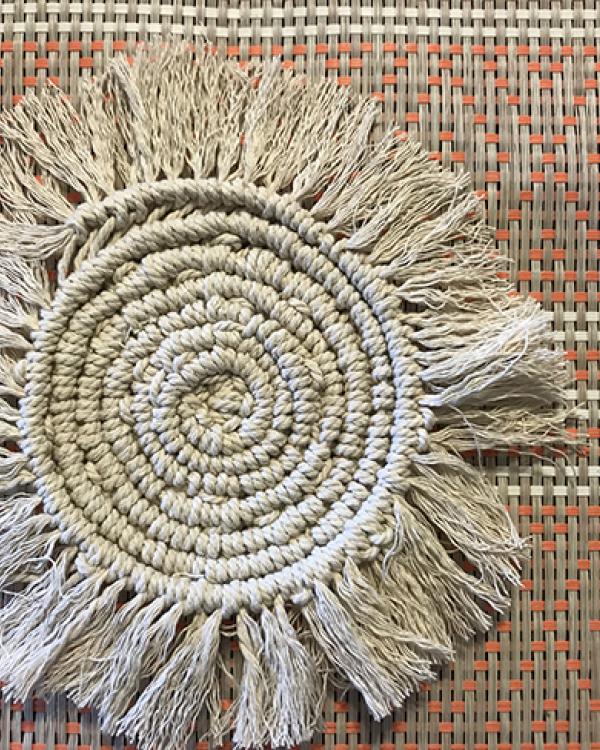
Coronavirus macramé
My usual quarterly routine looks a bit different than most of my fellow grad students, even before “the ’Rona.” I live about an hour from campus, a choice almost five years ago when I first was accepted to the PhD program. At the time I received the offer letter, I had a 4 month old son and it was the better option for our family to continue living in the rental home within walking distance from my in-laws. All the child-caregivers reading this will likely understand the appeal of staying near free baby-sitters. So, rather than live in grad-student housing, I made the commute to campus two, sometimes three days a week. I used to drive the minimum 2 hour, sometimes three hour commute, but now that there’s a shuttle that picks up from the train station, I’ve been taking the train.
In the midst of the current chaos, one good thing has been not needing to wake up at 4:45 am to catch the 5:45 am train, but I find myself realizing as I write this that I do miss that time to myself with the pink glow of the sun rising or setting over the ocean coming in through the window.
More than anything else from my usual work routine, I miss my students and colleagues. But it’s more than “missing,” this strange range of feelings that I and so many others have been experiencing. It’s grief. I’m grieving the sickness and pain and confusion and loss that so many of my friends and colleagues around the world are having to live with. I’m grieving normalcy. I’m grieving the opportunity to teach the new class I proposed last spring in the class environment I had planned. I’m grieving the relatively stable environment so many of my students have lost. I’m grieving the illusion that everything is alright.
Because it isn’t. Everything isn’t business as usual. My students cannot all join a Zoom session during our original class time. Some have medical issues or family members who do. Others have to work full or part-time either because they lost their on campus job, the front-line work they do has ramped up, or they’ve started working as emergency temp employees. Some students are sharing the one computer in their residence that can actually handle Zoom with siblings or peers. Others are working night-shifts and need to sleep during our regularly scheduled class period. So how do I adapt to this new teaching reality, especially as a scholar who centers her teaching not just on culturally relevant pedagogy, but also a pedagogy of (real, practical) care?
I’ve spent the past few weeks using CamScanner to make PDFs of book chapters, because many of my students have mentioned not having any idea when their books are going to arrive and others are unsure if they’ll be able to afford them. I’m sure I’m not the only one who has no desire to scan two pages at a time on my home printer and then combine them into a PDF. CamScanner makes it as painless as possible to create solid quality PDFs at home, including ones that are OCR (readable by a screen-reader). I’ve been trialing Perusall so students can actually interact directly with the text and have conversations with their peers about concepts and quotes from the readings. And yes, the engagement has been of higher frequency, quantity, and quality than the typical GauchoSpace discussion thread.
I’ve been recording my (optional) Zoom sessions, editing them in iMovie, uploading them to YouTube for the automatic subtitling, and after that, downloading them to share on our class GauchoSpace page. Why not GauchoCast? After all the delays I’ve read and heard about, plus the lack of automatic subtitling, I decided it was best to go ahead and record my mini-lectures in the way described.
With the above efforts, my course is not just asynchronous, but as accessible as I can possibly make it. None of this is meant as patting myself on the back; rather, it is meant as a way of reflecting on the labor so many of my fellow graduate teaching associates and assistants are doing without the full benefits and resources of being a faculty member. We are, all of us, doing more than the hours we’re supposed to be working, but that’s what everyone is doing right now. We’re all pitching in and working overtime. This is the new normal, mixed right in with baking and Netflix and starting new hobbies.
Michelle Grue is a doctoral candidate in the Department of Education, working toward a doctoral emphasis in Writing Studies while serving as the Writing and Literature Fellow at the College of Creative Studies. A proud #ScholarMom, Michelle is sheltering in place with her active, inquisitive, adorable, and at times exhausting five-year-old and her very patient (introverted) husband in Ventura County, CA - about an hour south of UCSB. She is practicing shelter-in-place self-care through journaling (personal and professional), arts (painting and singing) and crafts (macramé and preschool silliness), and taking walks (face covering on).